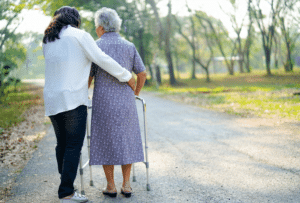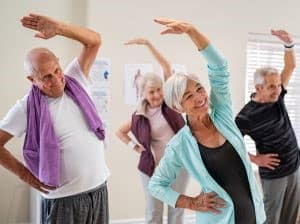
Discussions regarding Attention Deficit Hyperactivity Disorder (ADHD) frequently center on children and teenagers, but the difficulties that elders endure with this disease go neglected.
According to a survey, around 4% of adults suffer from ADHD. This figure calls into question the widely held belief that ADHD is only found in children. It underlines the necessity of recognizing and treating ADHD in adults, as it has a substantial influence on their quality of life and everyday functioning in ways that differ from how it manifests in children and younger people.
In this article, we will look at the often-overlooked area of ADHD in seniors, as well as treatment alternatives to help you better understand how to manage ADHD in seniors.
What Does ADHD Look Like in Seniors?
ADHD research in persons over the age of 60 finds significant patterns in symptom presentation. In-depth interviews with over 130 diagnosed people show the particular problems of aging. Common characteristics include problems with working memory, item misplacement, forgetfulness, and difficulties learning new things.
In social situations, older persons with ADHD may over-communicate, interrupt others, and struggle to sustain connections. Financial issues are also common due to a lifetime of bad money management. Procrastination, emotional instability, time management concerns, persistent hyperactivity, and social difficulties are among the difficulties described by these individuals.
Older persons with ADHD need extra help, especially after retirement, to manage their time, negotiate social situations, and achieve their goals. Later-life challenges mimic those faced by young people with ADHD entering new periods of life, stressing the significance of maintaining structure for symptom control. ADHD in seniors may not be commonly diagnosed. Hence, there are a few treatment options to consider.
What are The Treatment Options for ADHD in Seniors?
Treating ADHD in seniors poses unique challenges due to several factors. Firstly, the overlap of ADHD symptoms with typical age-related changes can lead to underdiagnosis or misinterpretation of symptoms as normal aging behaviors.
Medication management becomes intricate as seniors often have pre-existing health conditions, requiring careful consideration of potential interactions and side effects. Here are two options to consider.,
Stimulants Medications
The use of stimulants such as Vyvanse is considered for the treatment of ADHD in seniors by improving brain chemicals that govern attention and impulses. However, because age-related physiological changes impact medication tolerances and possible interactions, taking stimulants in seniors necessitates caution and constant monitoring.
To guarantee safe use, healthcare experts carefully examine the patient's medical history, current drugs, and underlying illnesses. They begin with lower dosages and progressively increase them based on individual response, with regular check-ins to evaluate effectiveness and any adverse effects.
Seniors are urged to interact actively with healthcare doctors, providing input on symptoms and general well-being. Collaboration among elders, caregivers, and the healthcare team is essential for optimizing treatment outcomes while avoiding risks and guaranteeing the medication's continued applicability.
Psychotherapy
Another effective treatment option for seniors with ADHD is psychotherapy, sometimes known as talk therapy. It can give clients support, coping methods, and knowledge to help them manage their symptoms successfully. Participating in an ADHD coaching course can further enhance these skills by offering structured strategies tailored to individual needs. Cognitive-behavioral therapy (CBT) is a type of psychotherapy that has shown promise in the treatment of ADHD symptoms in seniors.
Seniors may gain skills and techniques to manage their time better, enhance their organization, and build effective ways to reduce the burden of ADHD in their everyday lives through CBT. Psychotherapy can also help with linked issues like poor self-esteem, anxiety, or depression, which frequently coexist with ADHD.
Other therapeutic techniques, in addition to stimulants and psychotherapy, may be used based on the individual's unique needs. These may include lifestyle changes like exercise, a balanced diet, and good sleep hygiene, which can help with general well-being and symptom management.
How to Diagnose ADHD in Older Adults?
Diagnosis of Attention-Deficit/Hyperactivity Disorder (ADHD) in older persons can be difficult owing to several variables, including symptom overlap with other medical and psychiatric illnesses, changes in symptom presentation with time, and a lack of awareness regarding ADHD in older age groups. The following methods are now used to diagnose ADHD in older adults:
Clinical Assessment
Clinicians need a detailed and meticulous diagnostic approach to diagnose ADHD in elders appropriately. A complete medical history is taken, psychiatric interviews are conducted, and neuropsychological testing is used. Understanding the unique issues that older people encounter is critical, as ADHD symptoms frequently coincide with age-related cognitive impairments.
Clinicians carefully analyze the duration and effect of ADHD symptoms over time throughout the examination. Comorbidities and medication history are considered to acquire a thorough knowledge of the individual's health. Collaboration with family members and caregivers is encouraged to gather valuable and insightful viewpoints.
Medical and Psychiatric Evaluation
A complete medical and mental examination is required when examining Attention Deficit Hyperactivity Disorder (ADHD) in seniors. It's critical to understand that ADHD symptoms can occasionally mirror age-related cognitive impairment or other health issues. As a result, a comprehensive examination is required to give an accurate diagnosis.
The assessment procedure includes gathering a complete medical history and conducting psychiatric interviews. These procedures assist physicians in distinguishing ADHD from other diseases that may exhibit similar symptoms. A clearer image may be established by grasping the individual's background and circumstances.
Clinicians may establish a comfortable setting for elders to share their stories by treating the examination professionally and kindly. It fosters trust and open communication, essential in the assessment process.
Neuropsychological Testing
Neuropsychological testing is critical in the diagnosis of ADHD in seniors since it gives significant information about their cognitive performance. These tests probe many areas of cognition, such as attention, memory, executive skills, and processing speed. By analyzing these areas, clinicians can fully understand an individual's cognitive strengths and limitations.
Neuropsychological testing is beneficial in separating ADHD symptoms from typical age-related cognitive changes when diagnosing ADHD in seniors. This sophisticated method enables doctors to detect and distinguish ADHD symptoms from those caused by other probable causes.
Final Thoughts
It is essential to know the particular challenges that seniors with ADHD experience, as well as to grasp the treatment choices available. We can help older adults with ADHD live satisfying lives by promoting awareness and encouraging collaboration among healthcare professionals, caregivers, and individuals.
Seniors can improve their well-being and quality of life with correct diagnosis, tailored therapies, and continued support. So, if you or a loved one is dealing with ADHD in your golden years, keep in mind that treatment is accessible.








